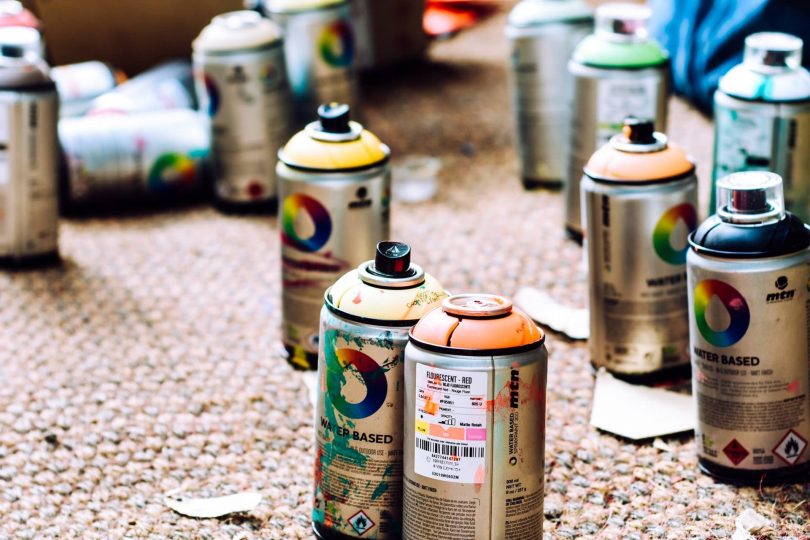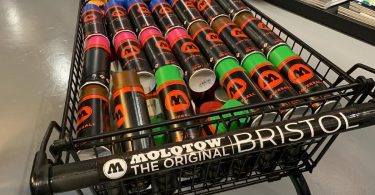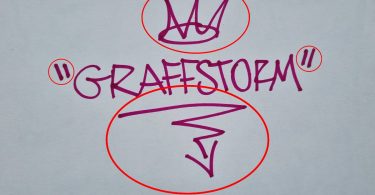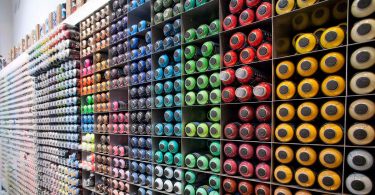Water based spray paint has been described as the future of spray paint by many artists and hobbyists alike.
It’s not only much better for the environment compared to traditional solvent based paints, but it’s better for artists’ health too. No more inhaling toxic fumes and nasty chemical smells!
But what exactly is water based spray paint? And if it’s so good, why are spray paints that contain nasty chemicals still more popular than water based formulas?
Don’t worry, we’ve got your questions covered. Here’s everything you need to know about water based spray paint.
What is water based spray paint?
Water based spray paint is simply a spray paint formulated with a water based solution rather than a traditional solvent or oil based solution.
The use of a water-soluble solution makes it less toxic and better for the environment than compared to traditional solvent or oil based spray paint.
What is water based spray paint good for?
Water based spray paint can be used for every application that traditional solvent or oil based spray paint is good for. It’s designed to be used in the same way, so it’s perfect for most surfaces.
For example, water based spray paint can be used for canvas art, graffiti and street art, DIY, arts and crafts, fine art and much more.
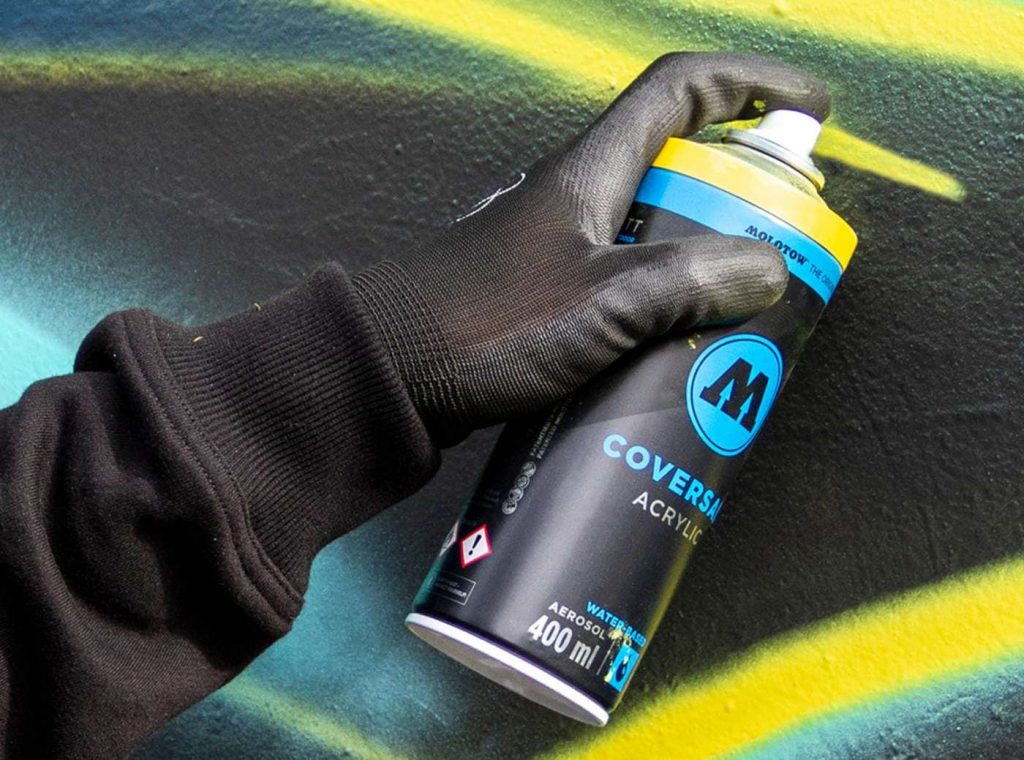
What are the benefits of water based spray paint?
There are many reasons to use water based spray paint as an alternative to solvent based formulas. Here’s a look at some of the top benefits:
1. Less toxic for artists
One of the biggest problems with traditional solvent or oil based spray paints is that they let off nasty toxic fumes. This means that for artists to be protected, they need to wear a respirator mask when spray painting.
Water based spray paint reduces the need to wear a mask as the formula they’re made from is non-toxic. Although be sure to check with the manufacturer as some water based formulas may not be entirely toxin-free.
2. Better for the environment
Water based spray paint doesn’t let off toxic fumes and nasty chemicals like traditional solvent based formulas do.
This makes them much more environmentally friendly as water based formulas contribute less to greenhouse gas emissions.
3. Little to no odour
Spray paints that use a water based formula have little to no odour compared to traditional solvent and oil based spray paints.
This makes them much easier to use for long spray painting sessions or situations where the strong smell of solvent may be a problem – such as painting indoors.
4. Better for indoor use
As water based spray paint has little to no odour and is free from toxins, water based spray paint is the best option for indoor use.
This is unlike solvent based spray paint which requires a high level of ventilation along with a respirator mask and safety equipment when painting inside.
5. Suitable for children
Parents have long avoided letting their children use spray paint as most contain harmful chemicals that are toxic when inhaled.
Water based formulas like MTN Water Based allow children to get creative with spray paint whilst also being safe. Plus, water based spray paint can be washed away before it dries, so there’s less risk of mess.
Although, always remember to supervise a child when they’re using spray paint.
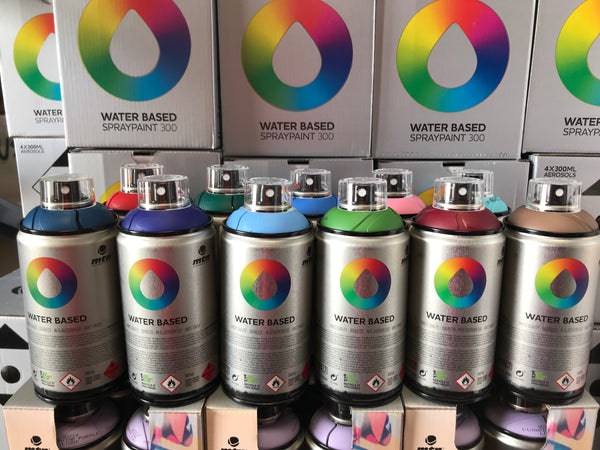
What are the drawbacks of water based spray paint?
Despite the many benefits of water based spray paint, there are also some issues which make traditional solvent based formulas a better option. For example:
1. Expensive
Water based spray paint is much more expensive than cheaper solvent based formulas. This makes it less of an option for artists who are spray painting on a budget.
You could be paying over double the price for a water based spray can compared to a non-water based formula. Most choose not to pay the premium because the benefits don’t justify the current price.
2. Colours may appear less vivid
Because water based spray paint lacks the chemicals that can give off a glossy finish like solvent based spray paint, you might find the colours aren’t as vibrant.
The best way to solve this is by finishing with a layer of primer over your finished work. This will help bring the colours to life and also add a layer of protection.
3. Less durable
Water based formulas are generally less resistant to the elements compared to chemical based formulas found in traditional spray paint.
This means that without finishing with a coat of primer, water based colours are less likely to stay vibrant for a long time. The best way to keep them vibrant is by using a primer.
4. Slow drying
As water based solutions take a longer time to dry, artists may prefer using solvent based paint if they’re in a rush.
There’s no doubt that solvent based spray paints dry much faster – usually in a matter of minutes. This is much slower than water based formulas that take around 15 minutes to an hour to be fully dry.
How can I tell if my spray paint is water based or solvent based?
Most manufacturers of water based spray paint will make it clear on the spray can that it contains a water based formula.
After all, this is the biggest selling point compared to solvent based paint, so manufacturers that use a water based formula usually make it obvious.
Otherwise, you should be able to tell by the odour.
If the paint has a strong chemical odour, it’s very likely to be solvent based. Water based spray paint usually has little to no odour.
Is water based spray paint safe for children?
In general, water based spray paints are much safer for children compared to solvent based spray paint. Check with the manufacturer beforehand to confirm whether the paint you choose is safe for children.
For example, MTN Water Based (one of the most popular water based spray paints) is safe for children to use. It also comes in a small 100ml can, which is perfect for small hands.
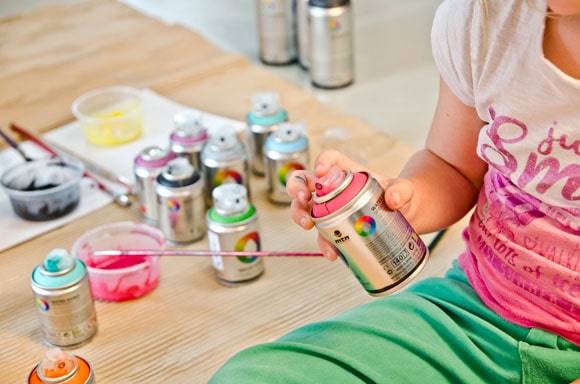
Is water based spray paint permanent?
Yes, most water based spray paints are permanent.
However, water based formulas can take longer to dry than solvent based spray paints.
Allow the paint to dry for around 15 minutes to an hour before it becomes permanent on a surface.
Is water based spray paint flammable?
In general, water based spray paint formulas are non-flammable compared to oil or solvent based spray paint solutions.
Be sure to check on the can before use as some formulas might still contain small amounts of flammable matter.
Can you use solvent or oil based spray paint over water based paint?
Yes, most water based spray paints won’t have any trouble layering with solvent based or oil based spray paints.
Water based spray paint, however, may appear more flat compared to solvent or oil based formulas. To make the colours pop, you may need to coat your work with a final layer of primer.
Also, be sure to shake the can well before use for best results. Water based formulas don’t bind together as well as solvent or oil based formulas.
Why is water based spray paint so expensive?
Simply put, water based spray paint is a new technology. This makes it more expensive to produce in scale compared to traditional solvent based paint.
Think of water based formulas like the electric cars of spray paint. They’re expensive to produce at first but as they become more popular, production costs fall and they become more accessible to everyone.
Many see water based formulas as the future of spray paint. So it’s likely only a matter of time once manufacturers are able to negotiate cheaper production costs and pass them down to the consumer.
Top tips for using water based spray paint
- Shake the can well. Paint pigments will have a tougher time sticking to water based formulas compared to solvent based paint solutions. Be sure to shake well before each use for the most opaque finish.
- Use a primer. Water based spray paint can appear flat on the first application. To bring out the colour, consider coating with a layer of primer spray for better final results. Plus, a primer layer will help keep your work protected.
- Allow the paint time to dry. Unlike fast-drying solvent based formulas, water based spray paint needs time to dry before it becomes permanent. Give the paint 15 minutes to an hour to dry so that it fully adheres to the surface.
Planning on using a water based formula for your next project? Drop a comment below and let us know what you’re working on.
